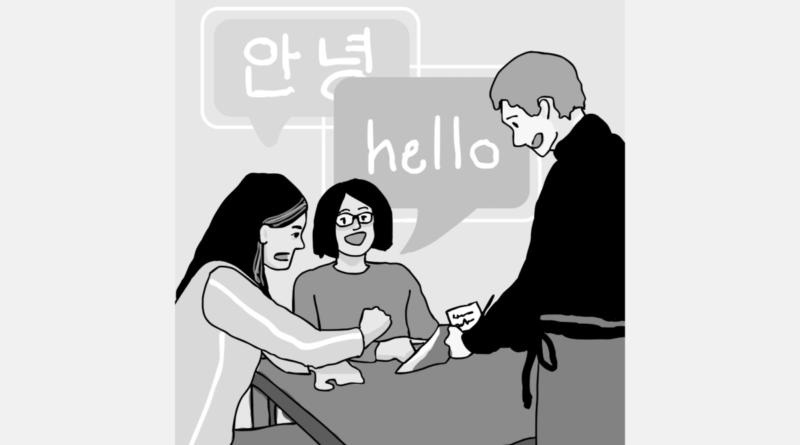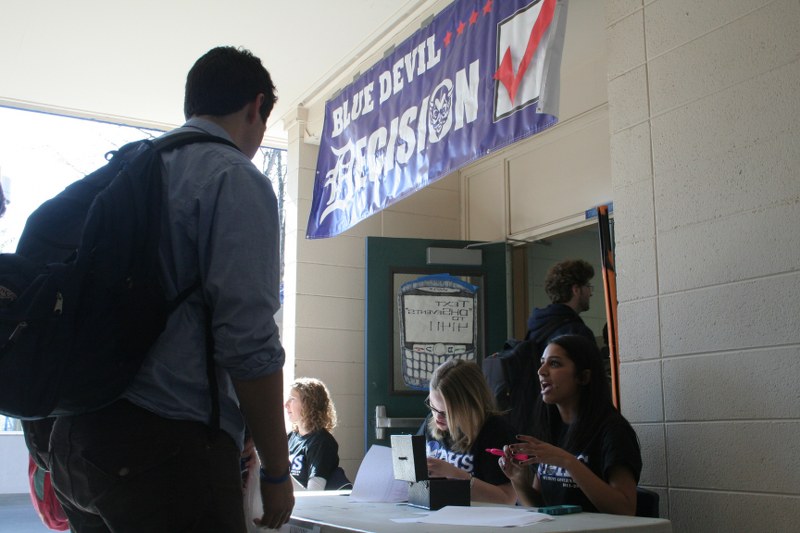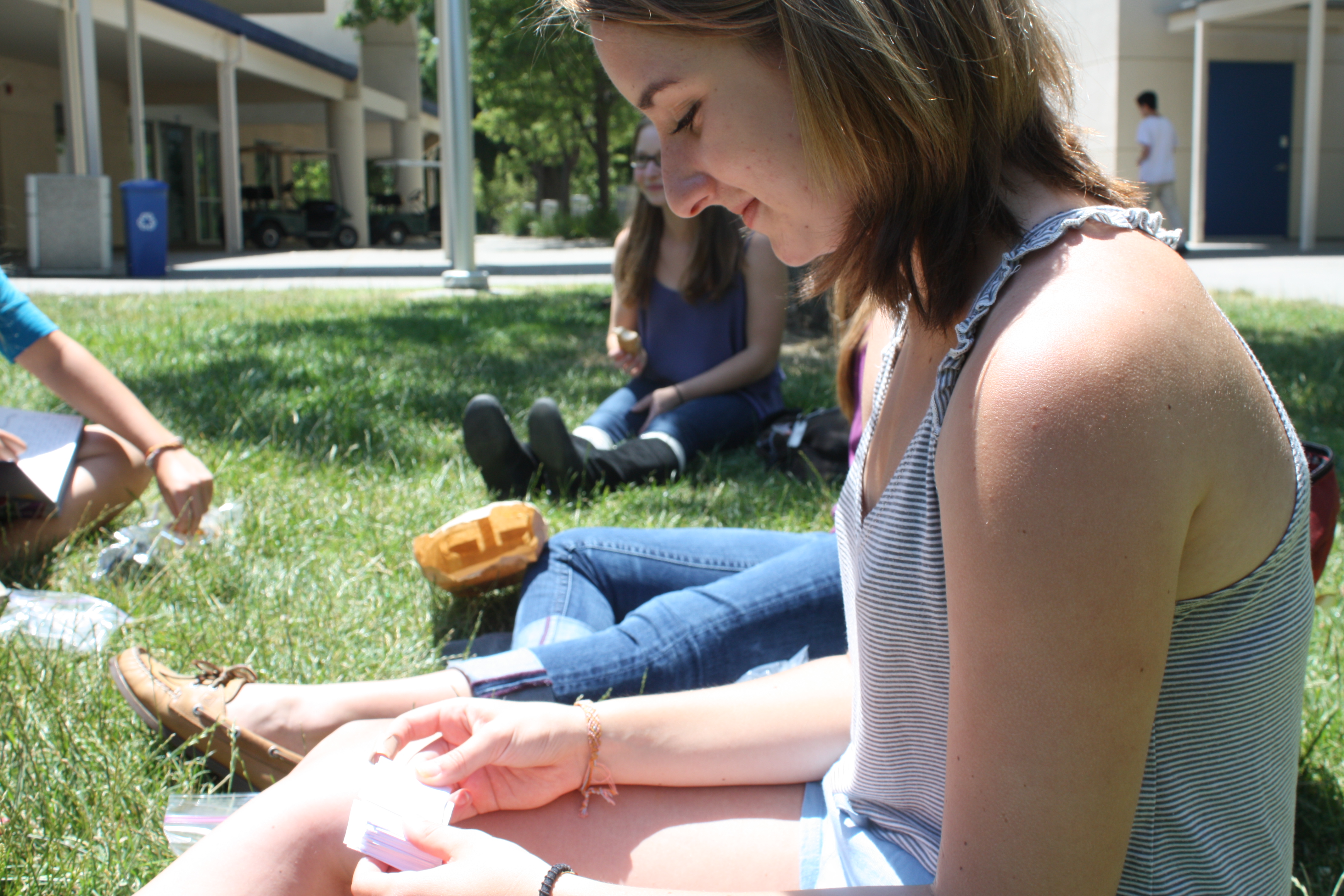Young interpreters bridge language gaps
PHOTO: Graphic by Maya Delaney
By Boyeon Choi
BlueDevilHUB.com Staff–
When I was 10, my mom and I went to a restaurant as a treat for dinner.
I was excited to get dinner and asked my mom if we could order a lot of food. Laughing, she told me that we should absolutely stuff ourselves.
My mom tried to order a few items on the menu, but the waiter couldn’t understand her. “We’ll get the ravioli with marinara sauce,” my mom said. Yet, due to her Korean accent, ravioli sounded closer to “labioli” and sauce sounded more like “soseu.”
The waiter started to ask my mom to repeat her order, but he spoke too quickly for her to understand. Despite receiving near-perfect scores on the English proficiency exam in Korea, she froze. My mom turned to me with eyes and whispered, “help me, Boyeon.”
Like 25% of students at Davis Joint Unified School District (DJUSD), my family speaks a different language at home. This can commonly cause children to be the primary translators for their parents.
To raise awareness about this role that many students play, the DJUSD Multilingual Department hosted a viewing of the short film “Translators” on Dec. 18.
“Translators” follows three students of different ages who had two commonalities: Spanish and interpretation.
“Interpretation is oral and translation is writing, (but) many people confuse the two terms,” said Ximena Diez-Jackson, coordinator of language justice and family partnership for the district.
“Translators” showed the students’ experience in not only interpretation, but also translating documents in Spanish for their parents.
DJUSD offers interpretation/translation services for parents, “so that students don’t have to be burdened,” according to Diez-Jackson.
The students from the film did not have this support from their schools.
“(DJUSD) provide(s) qualified, advanced language proficient interpreters for families, not placing an inappropriate burden on bilingual staff members and their families,” said Maria Luquin, DJUSD multilingual department director.
However, despite the help offered, some Davis High students, like senior Jacqueline Aleman Flores, do not have the luxury of using interpretation services.
She has been translating Spanish to English for her parents since she was 8 years old. “(This is) the role I have in my family. I go to appointments and meetings with my parents to translate. I even translate and look over emails for them too,” Flores said.
As much as it is an honor for her to do this for her family, sometimes, she finds it hard to find the right phrase. “Some phrases have a different meaning in English or in Spanish, so I can’t just translate things literally,” Flores said.
She’s also thankful to practice speaking Spanish regularly. “I prefer speaking Spanish over English, and this is because it’s the only way I can communicate and connect with my family,” Flores said.
Unlike Flores who has lived in the U.S. her entire life, there are also students like junior Michelle Hsu, who immigrated to Davis later in life, in 2021, at the age of 15. Hsu also translates from English to Chinese for her family when they visit her in the U.S.
“My parents wanted me to go to the U.S. because there were more opportunities for me here,” Hsu said.
Her parents had experience living in the U.S. prior to her permanent residency in Davis. “Even though they can speak English, they’re not comfortable,” she said.
Spending two years in Davis has helped her become accustomed to English. “I help other (Chinese students) who come to Davis. I often translate or explain what is meant by the teacher for them,” Hsu said.
Hsu is glad that she knows how to speak both English and Chinese, but she does wonder what it would be like if English was her first language. “I don’t think I would ever want to only speak English, but it’s hard (trying to) learn English as a teen,” Hsu said.
The experiences of these two child translators, and many more in the district highlight the struggles of the students but also the parents themselves. Learning English as a teen is hard enough, but attempting to learn English as an adult is significantly harder.
Back at the restaurant I translated for my mom, I didn’t have anything to say to the waiter, but she wanted me to say more.
“Tell him that he shouldn’t ignore me just because my English accent is bad and slow,” my mom said in Korean.
I dismissed my mom and instead thanked the waiter. My mom was mad, but also embarrassed.
“Why didn’t you tell him what I told you?” my mom said. “I can speak English well and you know that Boyeon.”
“But you don’t, Umma!” I said. “That’s why I always translate for you.”
My mom, who is the strongest woman I know, began to tear up.
After we finished, I knew I had to apologize.
“I’m sorry, mom, you’re not embarrassing. English is just not something you’re comfortable with yet,” I said.
“It’s fine, Boyeon. I’m so glad that I can rely on you for English,” my mom said.
There are many hardships when it comes to interpreting and translating for parents, especially since there is the burden of having to be accurate enough to be understood.
As I watched the movie, I was emotional. I understood now. My parents had sacrificed many things in order to be in the U.S. and their English skills didn’t reflect their intelligence, but rather, the lack of time they had.
Being able to translate is a vital skill to have, and one that gets better through practice. Each child translator has a unique and different story, but we all have one thing in common: we are resilient and persevere through our struggles.
When I was younger I hated having to translate for my mom in public, but now I take it as an honor.



